
11 minute read
Predict and Prevent
PREDICT PREVENT and
Mercedes Soria and Knightscope are shaping the future of autonomous security
interview and photos by Darby Campbell
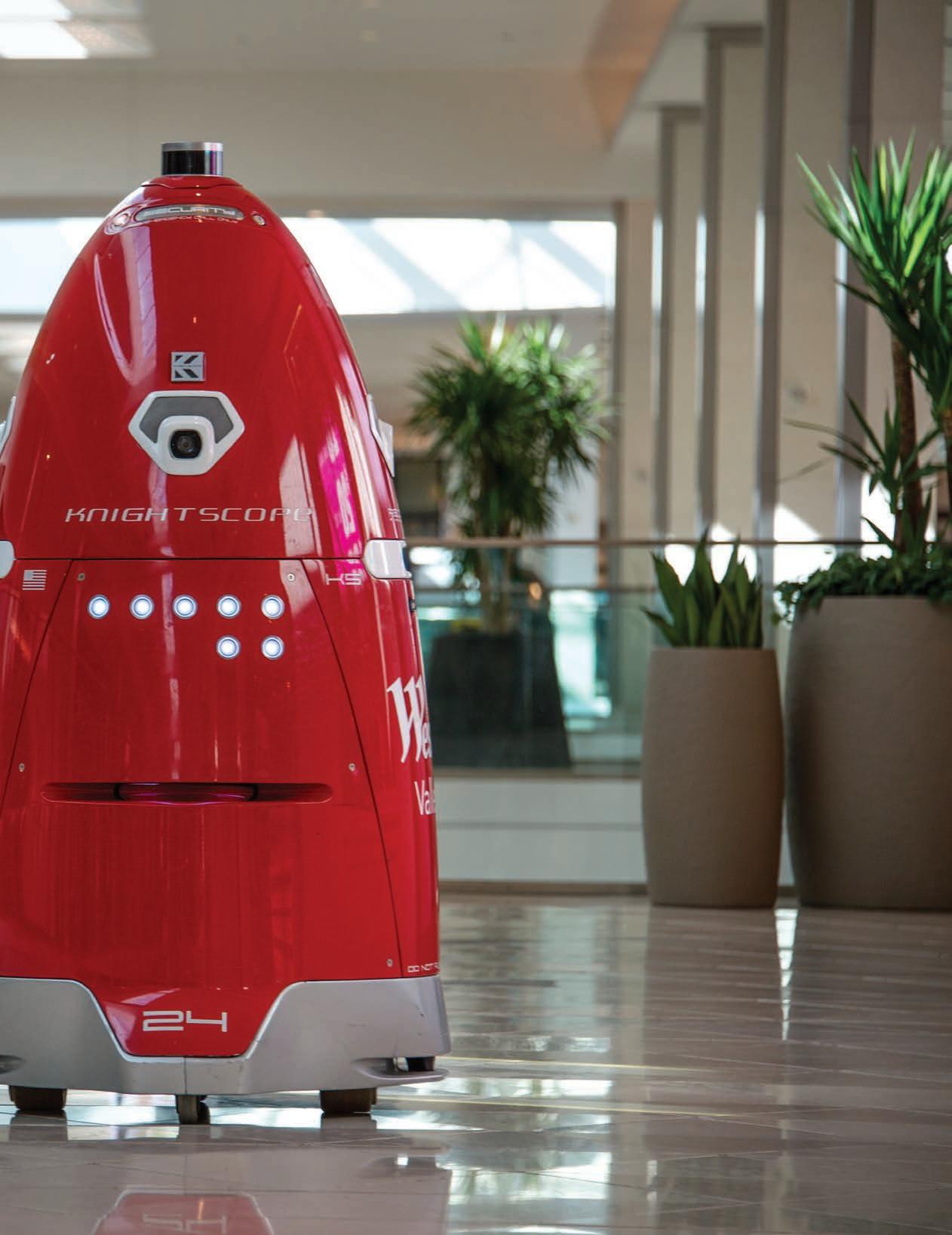
Robots fighting crime may sound like a sci-fi movie, but Knightscope has made it reality. We sat down with MTSU alumna Mercedes Soria (’96, ’98), executive vice president of software engineering and chief intelligence officer of Knightscope, a company that is changing the world for the better. The goal is to cut crime in the U.S. by 50% with its robots and prediction algorithms.
Top national business magazine Fast Company named Knightscope as one of the most innovative companies in the country for 2018. Tell us more about Knightscope. Knightscope is a physical security company. Our goal is to make the United States the safest country in the world. To be able to do this, we use the most up-to-date technologies in robotics, self-driving technology, artificial intelligence, and machine learning. Our motto is, “Software, plus hardware, plus humans.” Our goal is not to replace a security guard, but rather to augment what a security guard can do to keep people safe. Right now, we are deployed at about 20 sites in the United States in four time zones. We are about to go to Puerto Rico and are in talks to expand to Hawaii. We have about 120 machines that we’ve made. Our customers are Fortune 500 companies; the majority of them have security standards that we have to meet to be approved as their security provider, including cybersecurity. We’ve been in business since 2013.
We’ve had several crime-fighting wins. We helped stop a sexual predator, helped a company avoid a false insurance claim, and made a previously high-crime parking area safe at night. At a lot of the places where they’ve deployed Knightscope robots, the crime risk has gone down to zero. One hospital in Southern California had doctors and nurses leaving a late shift in a high-crime area. They placed a Knightscope K5, and crime in the parking area literally dropped to zero.
How did you get involved with Knightscope? I came to the U.S. specifically to study Computer Science at MTSU. After I got my bachelor’s and master’s from MTSU, I applied to about 50 companies, interviewed with three of those companies, and got one job offer. With that, I was allowed to stay in the U.S. I started working for Gibson, the company famed for its guitars. I updated Gibson’s technology systems and brought them online. After that I worked for Deloitte, one of the “Big Four” accounting organizations, doing systems implementations in Atlanta— which is where I met Bill and Stacy [CEO William Santana Li and CCO Stacy Dean Stephens]. They were starting Knightscope, and I came on board as the third member of the team. They were both hardware specialists and figured out that they needed software—that’s when they found me. You’ve won several awards for being a successful woman in the tech industry, including the Silicon Valley Woman of Influence award and an Abie for your efforts toward gender equality in the workplace. What achievements are you most proud of? This startup! Knightscope, by far.
I use to think the thing I was proudest of was my achievement of coming to a country where I did not speak the language. That was super hard. I wouldn’t have made it if it weren’t
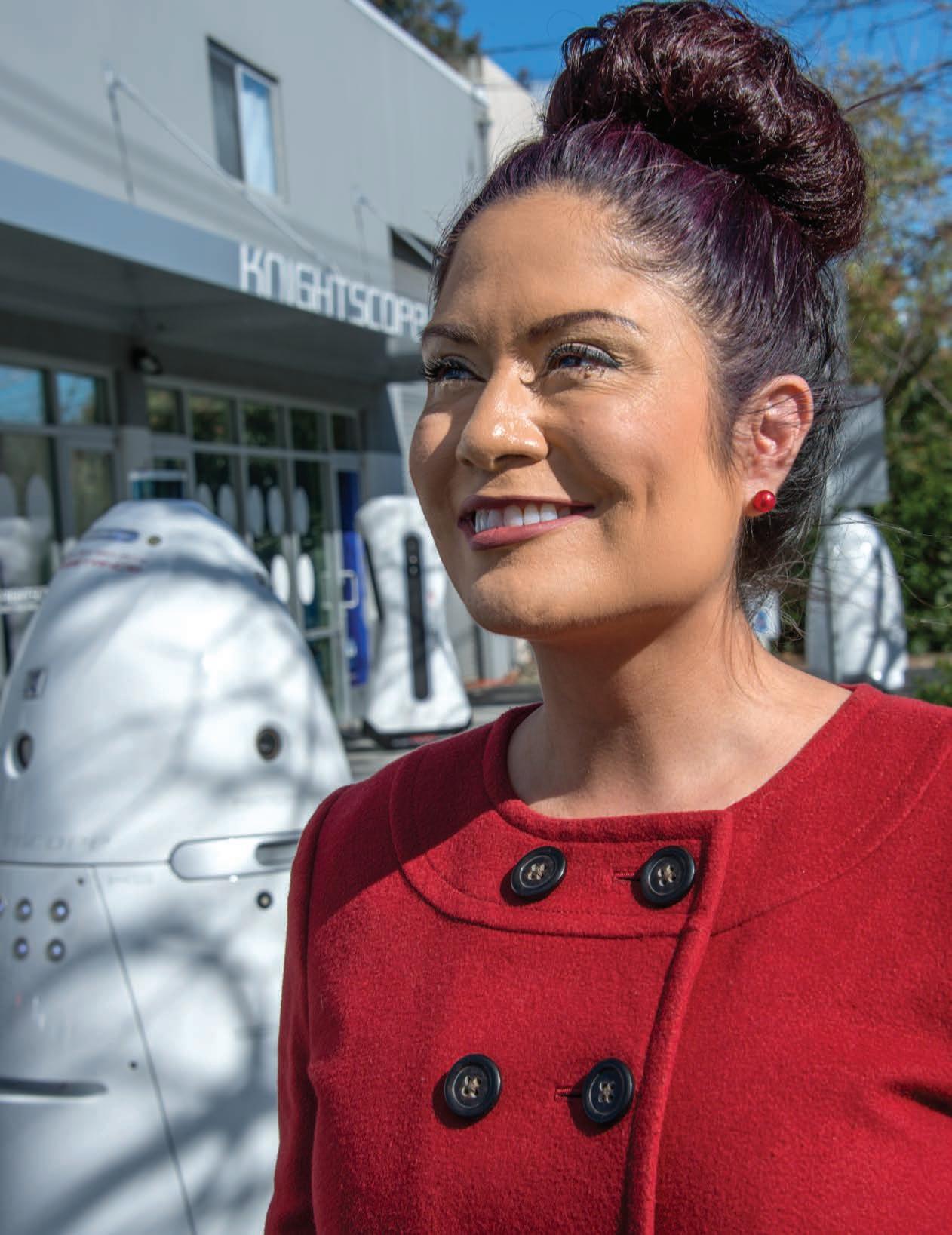
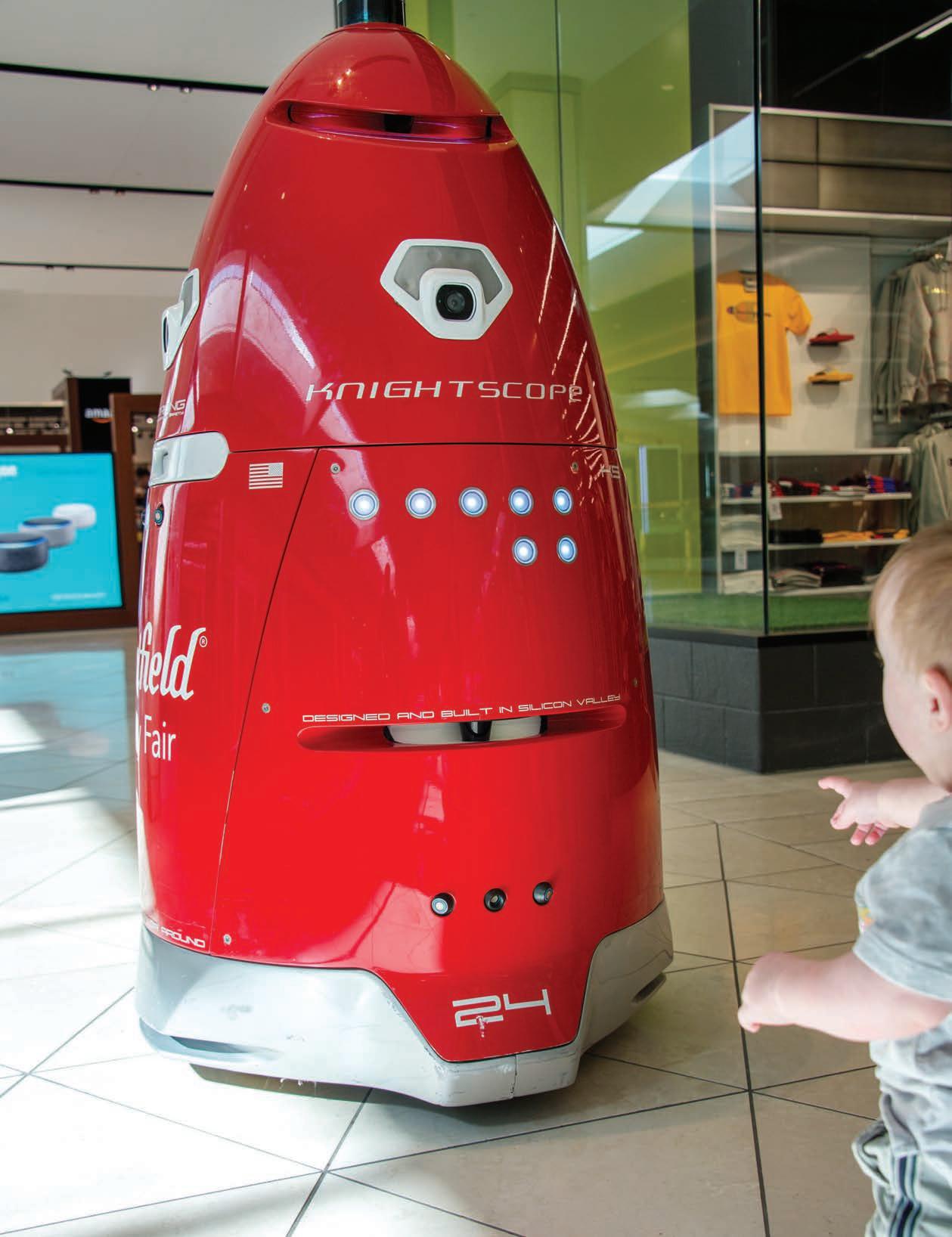
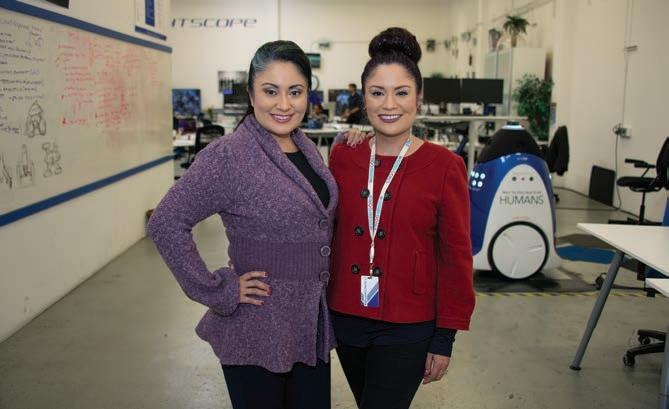
for my twin sister, Gloria. There were 20 of us who came on an exchange program with MTSU, and 18 went back to Ecuador after one year. We came with a scholarship, so the first six months were paid for—tuition, room, and food. I didn’t come from money; I came from a modest background. And then our university from Ecuador called and said, “The scholarship ends now. If you stay, you’re on your own.” We were supposed to be here for two years. The whole idea was: We have a degree in Ecuador, and we will validate our degree however necessary here so that we have a degree from the U.S.—which will pretty much qualify you to work anywhere you want in Ecuador. And then they ended our scholarships six months into it.
If my sister hadn’t been here, then I wouldn’t have made it. We didn’t have enough money to buy two meal plans at MTSU, so we would buy only one meal plan. For dinner, they had those Subway sandwiches at the cafeteria—we would buy a sandwich and split it in two, and each of us would eat half of a sandwich. That was our dinner for two years. We were each other’s support system. Then we started working in jobs that didn’t really require much talking because we didn’t speak the language. So we were doing desk assistance midnight to 7 a.m., on the weekends, and holidays, because nobody wants to be there. In the summer, we would paint dorm rooms. That was when we were eating half a sandwich for dinner and our breakfast was a little box of Fruit Loops. It was super, super hard. But hey, we made it. And we both graduated with honors.
And then Knightscope came along. And I thought Middle Tennessee State was hard! The long hours and the studying and the new technology. It was hard, but I think it was all worth it. If we can reach our goal of cutting crime, it was all worth it. It is what drives me to do the work that we do.
How did you get interested in computer science? I read Isaac Asimov’s Foundation series and asked myself, “What can I do that is even close to that? What can I do that is at least in the neighborhood of what I’m reading and thinking about?” Computer science was the only thing even close at that point. Then I started to work with computers and took programming classes. So when I went to college, I chose Computer
Science as my major. We are still a long way from Asimov’s ideas, but we are closer in little ways.
There’s two types of technology that we use with Knightscope. We use robotics technology, which is what the machine does. And then we use artificial intelligence, which is what we do with the information that we collect from the machine. Really for me, though, it’s all about the technology—the artificial intelligence, machine learning, speech recognition—that’s really what makes me get up in the morning.
What led you to become an executive mentor for the U.S. Department of State’s Tech Initiative? The first time I went into a Computer Science classroom, it was very apparent to me that there were no women there. It was in the back of my head when I was in Ecuador because that isn’t the stuff you talk about there. When I got to MTSU, I started to get letters from different organizations, some of which were titled for women in computer science. That’s when I decided, “OK, something is wrong here. It’s not evenly distributed. Where are all the women?” That’s when I started to pay attention.
After I moved to DeLoitte, that’s when my eyes really opened to what was possible. They have a lot of programs to help women in technology.
When I moved to the Silicon Valley area, I met other women in technology and they connected me with the Department of State. I’ve been mentoring women from around the world for the last three years. The thing I really like about this program is that it is meant for women who live in societies where it is not OK for a woman to be in technology. We bring about 130 women from Middle Eastern, South Asian, and African countries here to the U.S. every year. These are women who already have a little bit of technology in their background, and the majority are starting their own companies. So what I and other mentors do is guide them through the process of “OK, I have an idea that I’d like to start, so how do I go out to present that idea? A business plan, what is my pitch? What is my marketing strategy? How do I go into business?” All of this happens in about 6–8 weeks. We work with them one-on-one closely. And then when people go back to their countries, the idea is that they will go on to hire and help other women in their countries. In those countries, women are typically underrepresented in STEM careers.
This problem exists in Silicon Valley, too. Companies will proudly announce that they are 18% women. My goal at Knightscope is to get it to 50% women. We’re at about 30%, which is pretty good for robotics and technology, but I still think we have a long way to go.
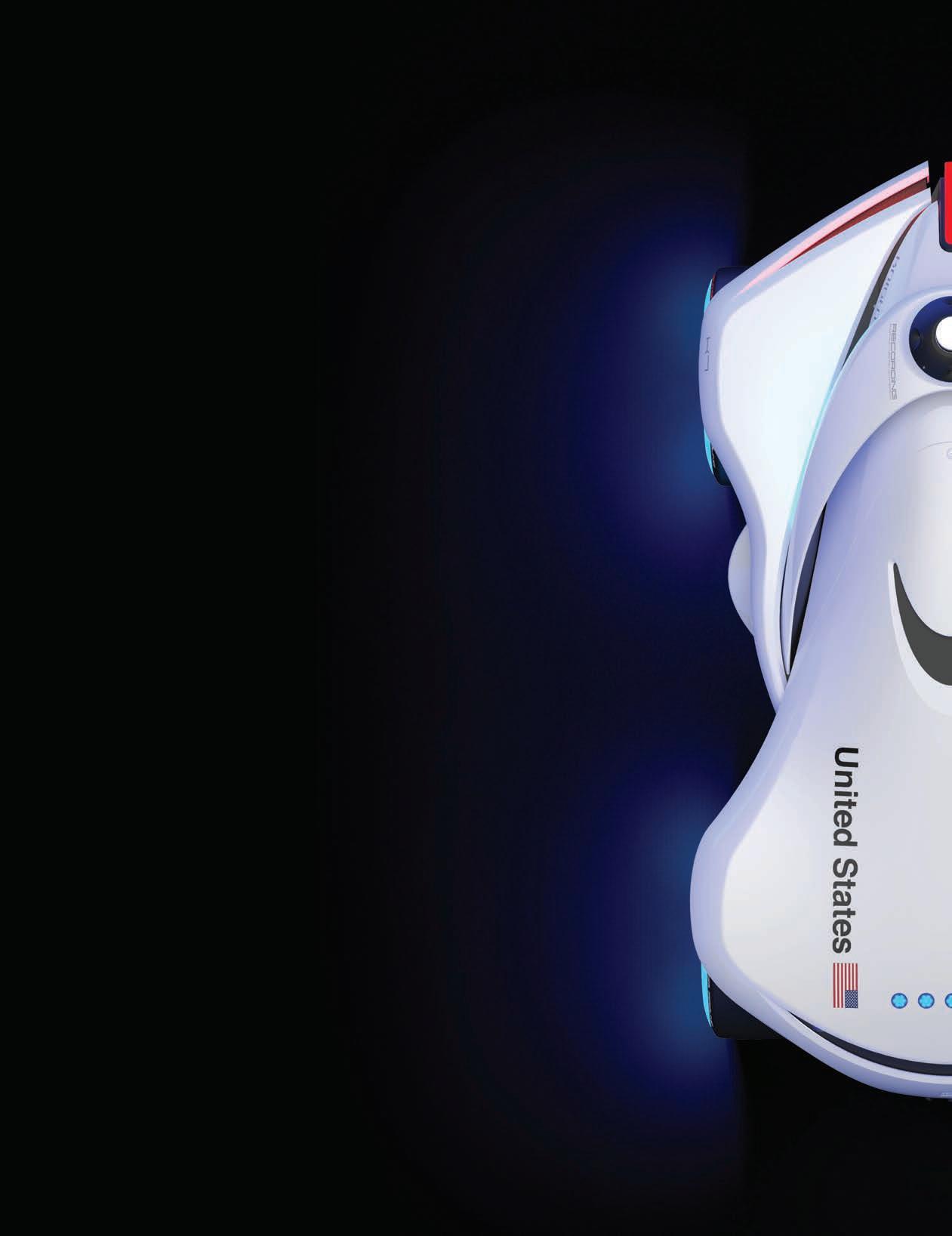
I believe the change that we can make locally is fulfilling, but the change that we can make nationally or globally—that is even more important. If you believe in something, you should implement it at home first and then expand. You’ve got a pretty impressive pedigree—Harvard, Emory, MIT. Did your foundation at MTSU prepare you for these things? I think so, yes. For me, MTSU was very, very difficult because I didn’t know the language at all when I came to this country. The only way I was able to pass stats was because I would memorize books. I barely knew what the professor talked about in class, and then I would go read all night long and pass the next day. My English was so bad that I would only know there was a quiz because people were putting away their belongings and taking a piece of paper out. “Oh, that must be a quiz!”
My advisor at MTSU was awesome. He told me that if you can go one step at a time, you can get very far. He showed me that with my thesis project, on how to connect the main database at MTSU to the web. The first part was trying to do a database, which now is two lines of code, but back then that was a big thing. I was having trouble and my advisor said, “Mercedes, every problem you have, you have to take the smallest thing that you can do and then go on to the next thing that you can do. Don’t try to solve the problem all together. Do it little by
There have been projects, like when I started with Knightscope—it was a huge mountain of technology because robotics was new to me. Little by little, learn one thing every day and eventually you will get there. That’s how I’ve done my career in artificial intelligence. That’s what I learned at MTSU. MTSU has a really special place in my heart. Do you have any advice for those just starting out in the tech industry? Find a mentor! It’s never too late, especially if you’re a woman in technology. You might not see anyone in leadership that looks like you or speaks like you, but look for them. Find them. It’s the most valuable asset that you might find in your career. There’s plenty of organizations out there that focus on women in technology. That will help you get further along in your career, for sure.
There was recently an outpouring of affection for the Mars rover Opportunity. In your experience do people get attached to your robots? I know! I was one of those that was crying over Oppy!
Originally when we would go to a deployment, people would get a little uneasy because there’s always the “It’s watching me all the time” part, right? But it was one little change that made all the difference. One of our clients decided to name the robot and had a naming contest. Once the robot was no longer a robot, but Eddie, then “Eddie’s over there, no big deal. We like Eddie!”
As soon as you humanize that robot, there’s no problem. People are like, “Hey, be careful with Eddie! Don’t push it.” Or “Hey, don’t kick Eddie!” We had no idea this was going to happen. We’ve noticed that for the clients who name their robot, it just becomes part of their infrastructure.

People take selfies with our robots. One thing we didn’t expect: The machine is white, and then we started seeing lipstick on the robot. These women are kissing the machine! We started to get calls from the customer, “Hey, can you come wipe down the machine?” What is it? “Lipstick!” People have been very accepting.
Do you have any particularly fond memories or funny moments from your time at MTSU? Homecoming! I saw the first Homecoming and thought, “WHAT IS THIS?!” Everybody’s partying, there’s a parade! What is going on?! I didn’t really speak the language very well, so I wasn’t really sure. And then they were like, “Free food?” And I was like, “YES! This is awesome!” Homecoming was good! I never actually made the Homecoming game but I was there for the parade, the food, all the good stuff. It was awesome.
There was a really great international students’ office. When we lost our scholarship, we had to go on a different type of visa, and the lady working there walked us through it and held our hand so we could make it through. I have really fond memories of MTSU. MTSU is awesome. MTSU










